Mental Health Reflection: Exploring Personal Beliefs and Practice
VerifiedAdded on 2022/10/04
|9
|2073
|10
Homework Assignment
AI Summary
This assignment is a comprehensive reflection on the student's personal beliefs, experiences, and attitudes towards mental health. It explores the influence of religious beliefs, personal experiences of living with mentally ill individuals, and cultural practices on shaping their perspectives. The assignment also analyzes the impact of social media and media portrayals on mental health awareness and understanding, including charity activities and educational programs. The student discusses the challenges encountered while working with mentally ill people, such as communication barriers and behavioral issues, and how these experiences have altered their views. Furthermore, the assignment addresses the effects of homophobia and transphobia on mental health, exploring the risks of mental problems, self-harm, and suicide within the LGBTQ+ community. The student reflects on how this knowledge will inform their approach to counseling and support for individuals facing these challenges, emphasizing the importance of understanding the root causes of mental disorders and providing appropriate interventions.
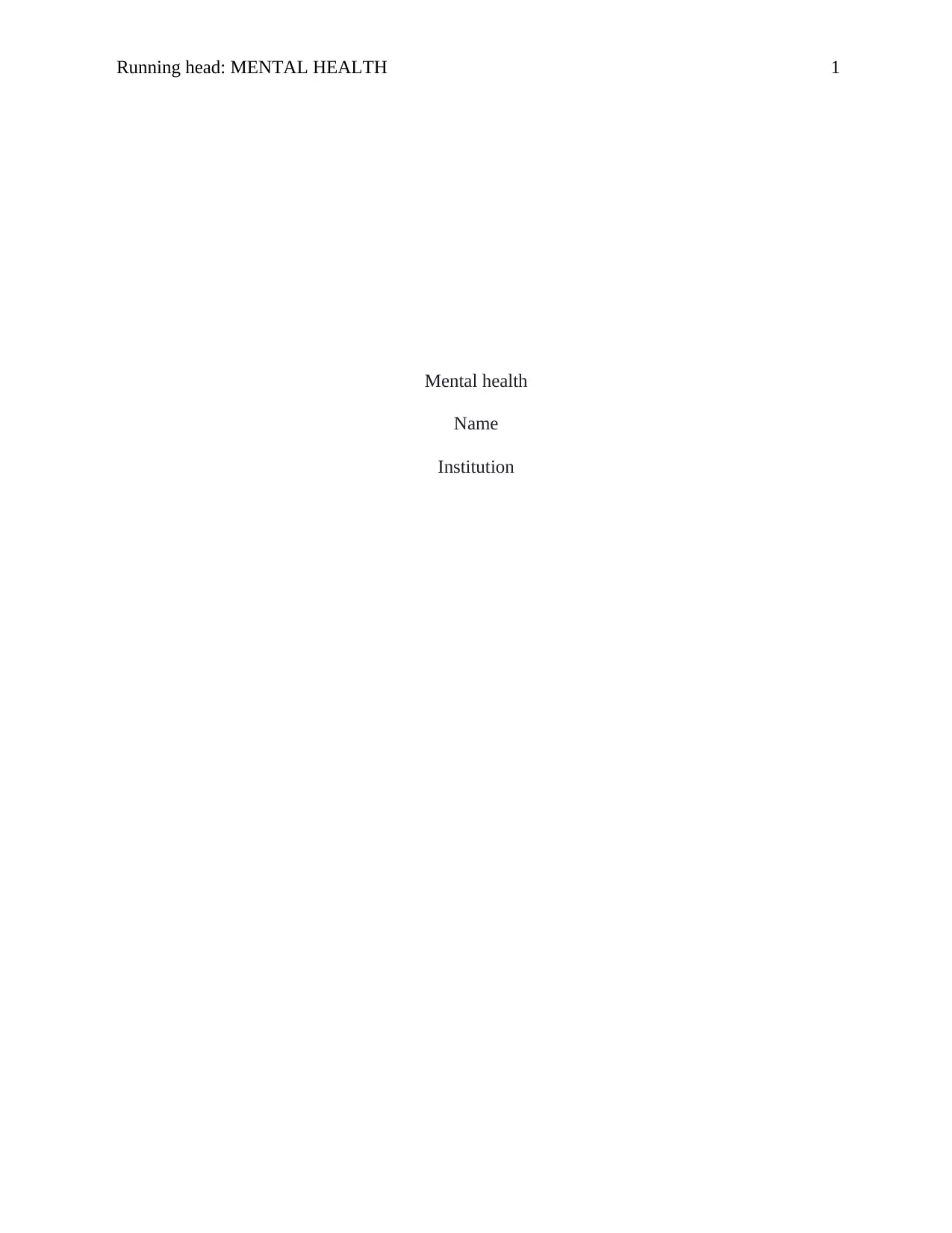
Running head: MENTAL HEALTH 1
Mental health
Name
Institution
Mental health
Name
Institution
Paraphrase This Document
Need a fresh take? Get an instant paraphrase of this document with our AI Paraphraser
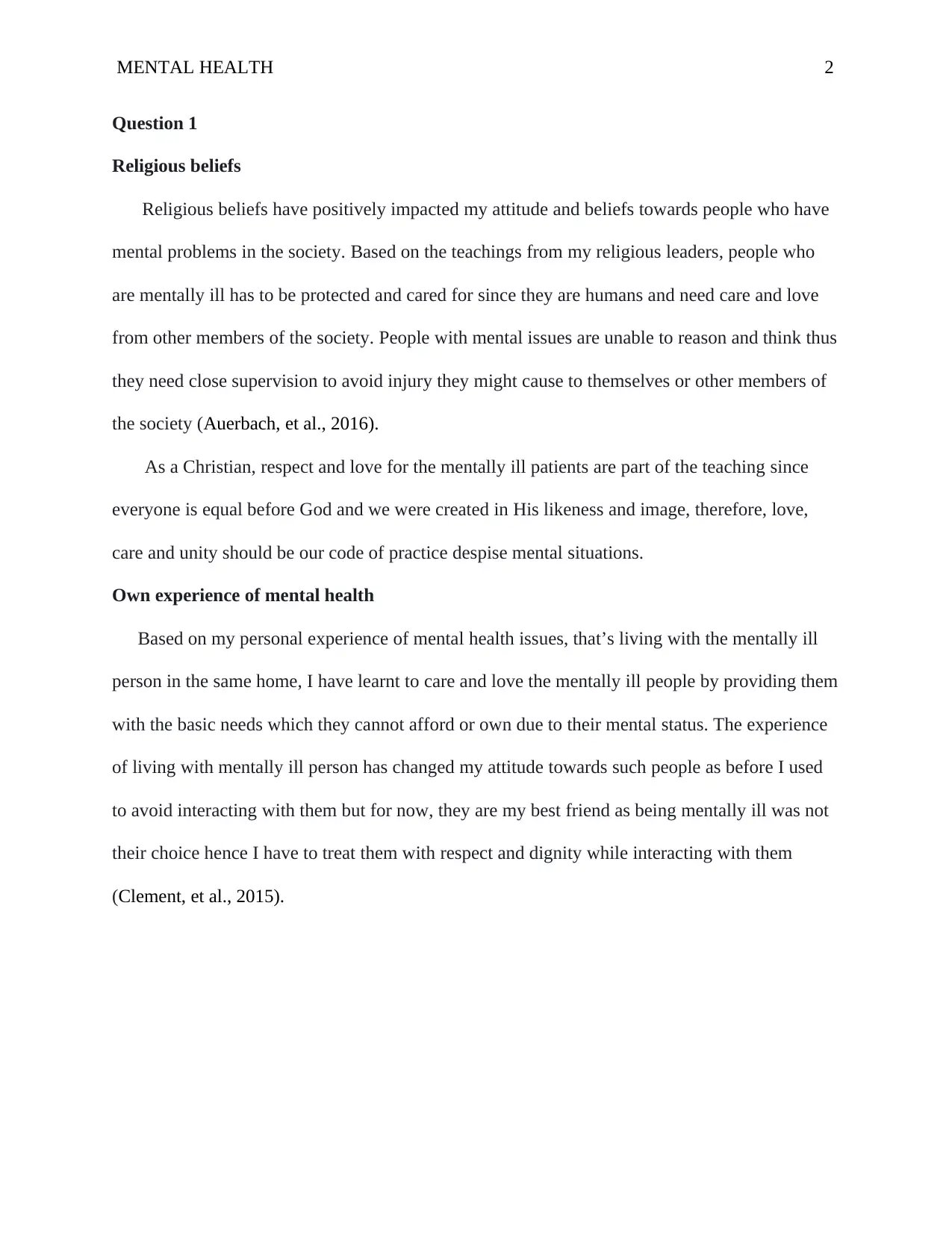
MENTAL HEALTH 2
Question 1
Religious beliefs
Religious beliefs have positively impacted my attitude and beliefs towards people who have
mental problems in the society. Based on the teachings from my religious leaders, people who
are mentally ill has to be protected and cared for since they are humans and need care and love
from other members of the society. People with mental issues are unable to reason and think thus
they need close supervision to avoid injury they might cause to themselves or other members of
the society (Auerbach, et al., 2016).
As a Christian, respect and love for the mentally ill patients are part of the teaching since
everyone is equal before God and we were created in His likeness and image, therefore, love,
care and unity should be our code of practice despise mental situations.
Own experience of mental health
Based on my personal experience of mental health issues, that’s living with the mentally ill
person in the same home, I have learnt to care and love the mentally ill people by providing them
with the basic needs which they cannot afford or own due to their mental status. The experience
of living with mentally ill person has changed my attitude towards such people as before I used
to avoid interacting with them but for now, they are my best friend as being mentally ill was not
their choice hence I have to treat them with respect and dignity while interacting with them
(Clement, et al., 2015).
Question 1
Religious beliefs
Religious beliefs have positively impacted my attitude and beliefs towards people who have
mental problems in the society. Based on the teachings from my religious leaders, people who
are mentally ill has to be protected and cared for since they are humans and need care and love
from other members of the society. People with mental issues are unable to reason and think thus
they need close supervision to avoid injury they might cause to themselves or other members of
the society (Auerbach, et al., 2016).
As a Christian, respect and love for the mentally ill patients are part of the teaching since
everyone is equal before God and we were created in His likeness and image, therefore, love,
care and unity should be our code of practice despise mental situations.
Own experience of mental health
Based on my personal experience of mental health issues, that’s living with the mentally ill
person in the same home, I have learnt to care and love the mentally ill people by providing them
with the basic needs which they cannot afford or own due to their mental status. The experience
of living with mentally ill person has changed my attitude towards such people as before I used
to avoid interacting with them but for now, they are my best friend as being mentally ill was not
their choice hence I have to treat them with respect and dignity while interacting with them
(Clement, et al., 2015).
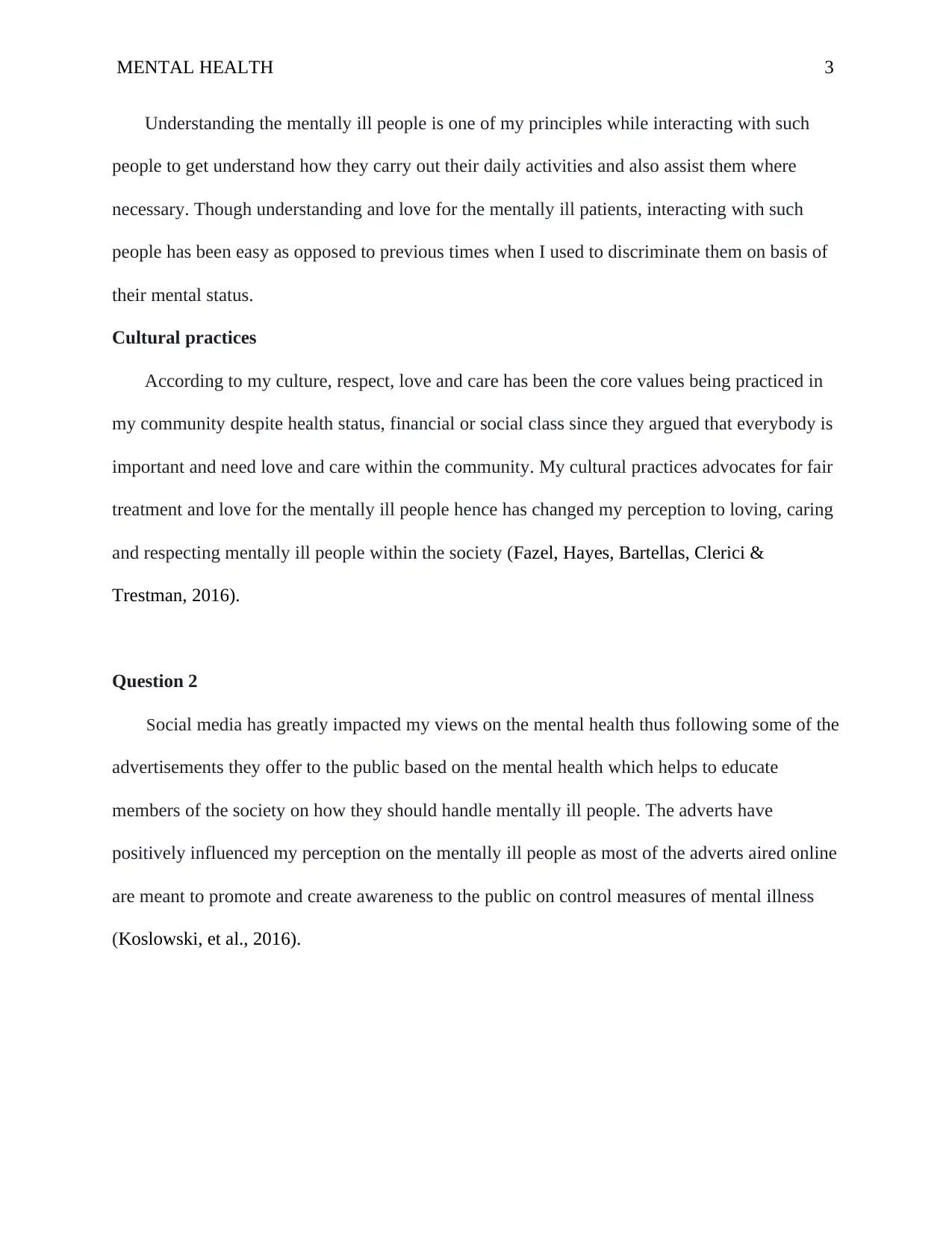
MENTAL HEALTH 3
Understanding the mentally ill people is one of my principles while interacting with such
people to get understand how they carry out their daily activities and also assist them where
necessary. Though understanding and love for the mentally ill patients, interacting with such
people has been easy as opposed to previous times when I used to discriminate them on basis of
their mental status.
Cultural practices
According to my culture, respect, love and care has been the core values being practiced in
my community despite health status, financial or social class since they argued that everybody is
important and need love and care within the community. My cultural practices advocates for fair
treatment and love for the mentally ill people hence has changed my perception to loving, caring
and respecting mentally ill people within the society (Fazel, Hayes, Bartellas, Clerici &
Trestman, 2016).
Question 2
Social media has greatly impacted my views on the mental health thus following some of the
advertisements they offer to the public based on the mental health which helps to educate
members of the society on how they should handle mentally ill people. The adverts have
positively influenced my perception on the mentally ill people as most of the adverts aired online
are meant to promote and create awareness to the public on control measures of mental illness
(Koslowski, et al., 2016).
Understanding the mentally ill people is one of my principles while interacting with such
people to get understand how they carry out their daily activities and also assist them where
necessary. Though understanding and love for the mentally ill patients, interacting with such
people has been easy as opposed to previous times when I used to discriminate them on basis of
their mental status.
Cultural practices
According to my culture, respect, love and care has been the core values being practiced in
my community despite health status, financial or social class since they argued that everybody is
important and need love and care within the community. My cultural practices advocates for fair
treatment and love for the mentally ill people hence has changed my perception to loving, caring
and respecting mentally ill people within the society (Fazel, Hayes, Bartellas, Clerici &
Trestman, 2016).
Question 2
Social media has greatly impacted my views on the mental health thus following some of the
advertisements they offer to the public based on the mental health which helps to educate
members of the society on how they should handle mentally ill people. The adverts have
positively influenced my perception on the mentally ill people as most of the adverts aired online
are meant to promote and create awareness to the public on control measures of mental illness
(Koslowski, et al., 2016).
⊘ This is a preview!⊘
Do you want full access?
Subscribe today to unlock all pages.

Trusted by 1+ million students worldwide
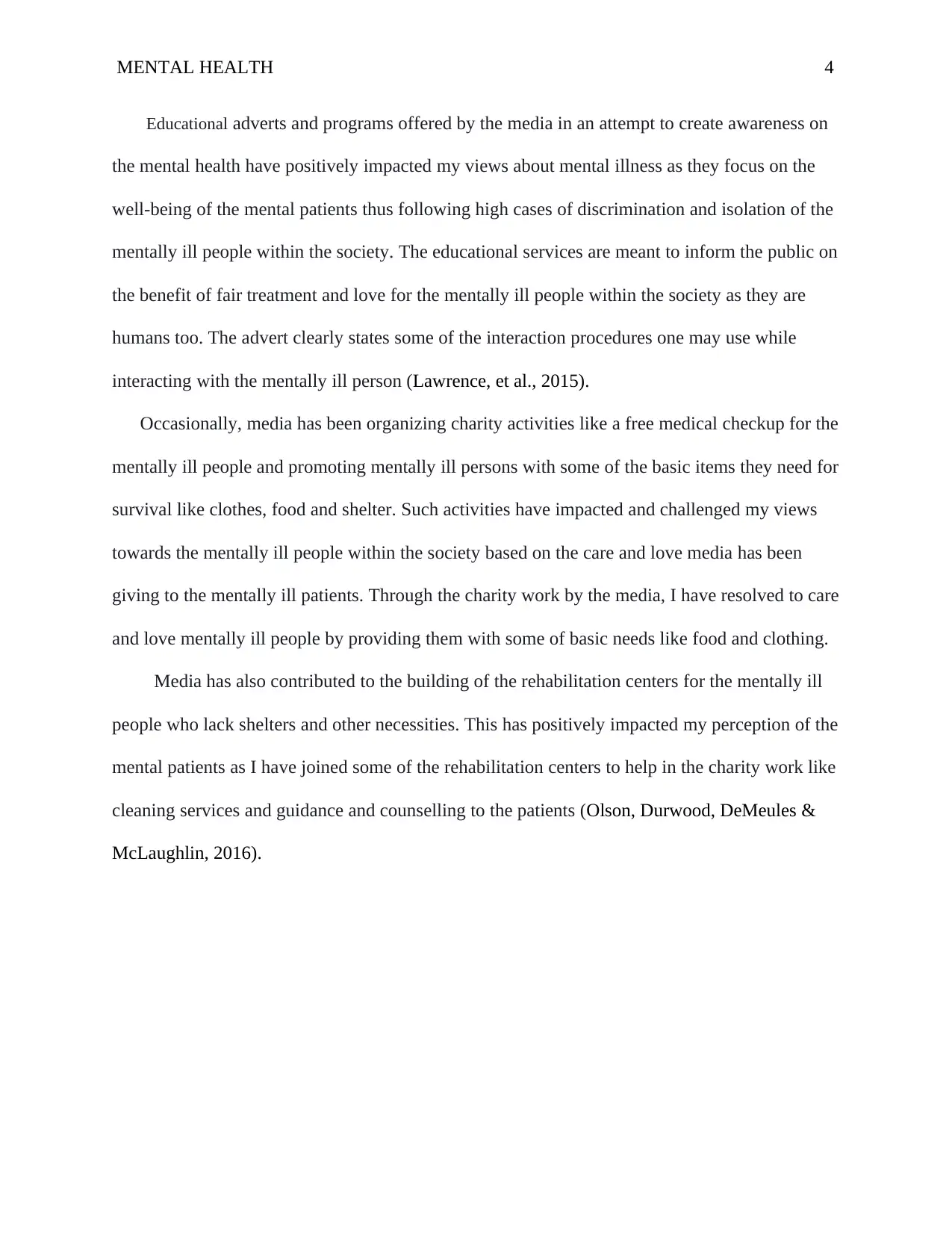
MENTAL HEALTH 4
Educational adverts and programs offered by the media in an attempt to create awareness on
the mental health have positively impacted my views about mental illness as they focus on the
well-being of the mental patients thus following high cases of discrimination and isolation of the
mentally ill people within the society. The educational services are meant to inform the public on
the benefit of fair treatment and love for the mentally ill people within the society as they are
humans too. The advert clearly states some of the interaction procedures one may use while
interacting with the mentally ill person (Lawrence, et al., 2015).
Occasionally, media has been organizing charity activities like a free medical checkup for the
mentally ill people and promoting mentally ill persons with some of the basic items they need for
survival like clothes, food and shelter. Such activities have impacted and challenged my views
towards the mentally ill people within the society based on the care and love media has been
giving to the mentally ill patients. Through the charity work by the media, I have resolved to care
and love mentally ill people by providing them with some of basic needs like food and clothing.
Media has also contributed to the building of the rehabilitation centers for the mentally ill
people who lack shelters and other necessities. This has positively impacted my perception of the
mental patients as I have joined some of the rehabilitation centers to help in the charity work like
cleaning services and guidance and counselling to the patients (Olson, Durwood, DeMeules &
McLaughlin, 2016).
Educational adverts and programs offered by the media in an attempt to create awareness on
the mental health have positively impacted my views about mental illness as they focus on the
well-being of the mental patients thus following high cases of discrimination and isolation of the
mentally ill people within the society. The educational services are meant to inform the public on
the benefit of fair treatment and love for the mentally ill people within the society as they are
humans too. The advert clearly states some of the interaction procedures one may use while
interacting with the mentally ill person (Lawrence, et al., 2015).
Occasionally, media has been organizing charity activities like a free medical checkup for the
mentally ill people and promoting mentally ill persons with some of the basic items they need for
survival like clothes, food and shelter. Such activities have impacted and challenged my views
towards the mentally ill people within the society based on the care and love media has been
giving to the mentally ill patients. Through the charity work by the media, I have resolved to care
and love mentally ill people by providing them with some of basic needs like food and clothing.
Media has also contributed to the building of the rehabilitation centers for the mentally ill
people who lack shelters and other necessities. This has positively impacted my perception of the
mental patients as I have joined some of the rehabilitation centers to help in the charity work like
cleaning services and guidance and counselling to the patients (Olson, Durwood, DeMeules &
McLaughlin, 2016).
Paraphrase This Document
Need a fresh take? Get an instant paraphrase of this document with our AI Paraphraser
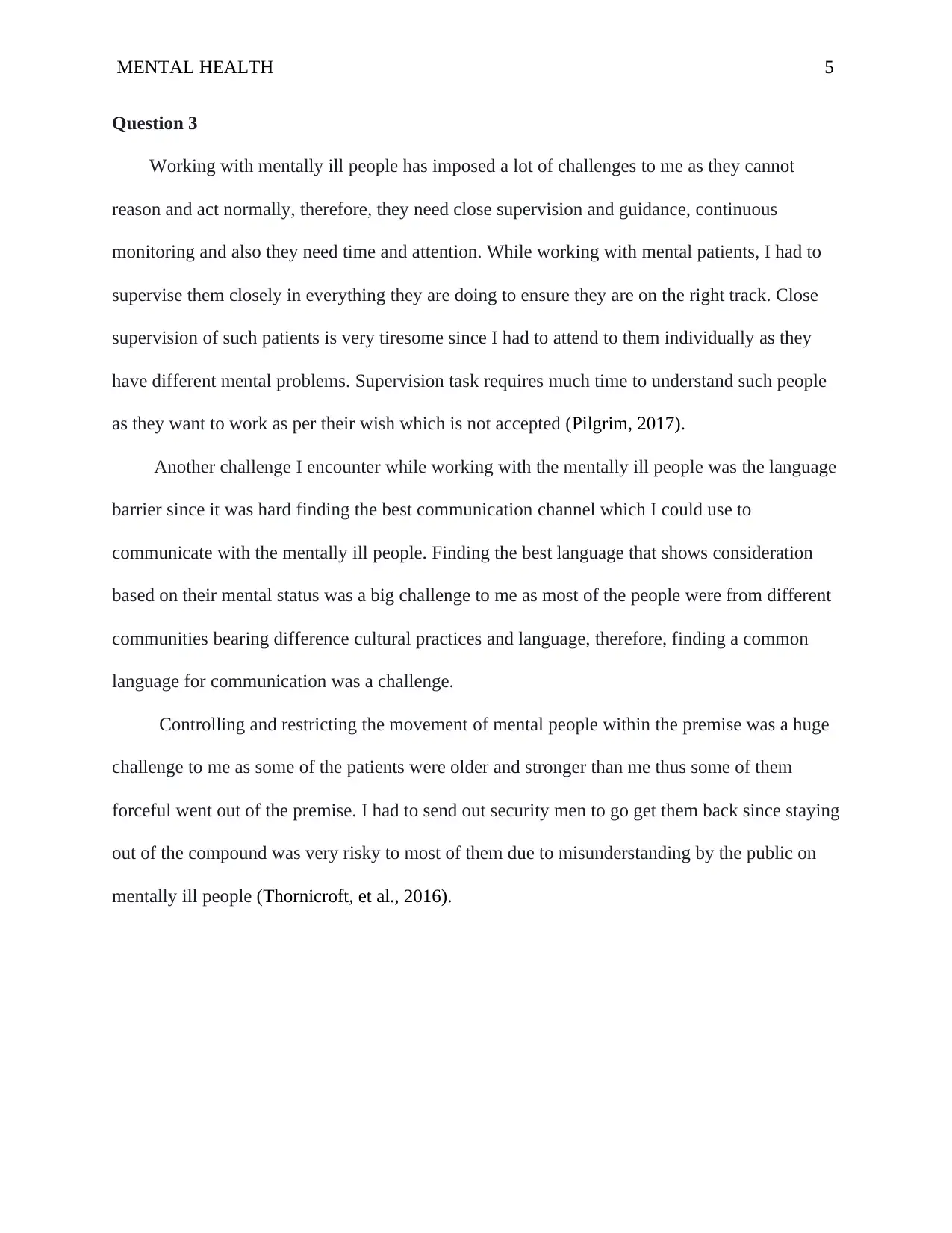
MENTAL HEALTH 5
Question 3
Working with mentally ill people has imposed a lot of challenges to me as they cannot
reason and act normally, therefore, they need close supervision and guidance, continuous
monitoring and also they need time and attention. While working with mental patients, I had to
supervise them closely in everything they are doing to ensure they are on the right track. Close
supervision of such patients is very tiresome since I had to attend to them individually as they
have different mental problems. Supervision task requires much time to understand such people
as they want to work as per their wish which is not accepted (Pilgrim, 2017).
Another challenge I encounter while working with the mentally ill people was the language
barrier since it was hard finding the best communication channel which I could use to
communicate with the mentally ill people. Finding the best language that shows consideration
based on their mental status was a big challenge to me as most of the people were from different
communities bearing difference cultural practices and language, therefore, finding a common
language for communication was a challenge.
Controlling and restricting the movement of mental people within the premise was a huge
challenge to me as some of the patients were older and stronger than me thus some of them
forceful went out of the premise. I had to send out security men to go get them back since staying
out of the compound was very risky to most of them due to misunderstanding by the public on
mentally ill people (Thornicroft, et al., 2016).
Question 3
Working with mentally ill people has imposed a lot of challenges to me as they cannot
reason and act normally, therefore, they need close supervision and guidance, continuous
monitoring and also they need time and attention. While working with mental patients, I had to
supervise them closely in everything they are doing to ensure they are on the right track. Close
supervision of such patients is very tiresome since I had to attend to them individually as they
have different mental problems. Supervision task requires much time to understand such people
as they want to work as per their wish which is not accepted (Pilgrim, 2017).
Another challenge I encounter while working with the mentally ill people was the language
barrier since it was hard finding the best communication channel which I could use to
communicate with the mentally ill people. Finding the best language that shows consideration
based on their mental status was a big challenge to me as most of the people were from different
communities bearing difference cultural practices and language, therefore, finding a common
language for communication was a challenge.
Controlling and restricting the movement of mental people within the premise was a huge
challenge to me as some of the patients were older and stronger than me thus some of them
forceful went out of the premise. I had to send out security men to go get them back since staying
out of the compound was very risky to most of them due to misunderstanding by the public on
mentally ill people (Thornicroft, et al., 2016).
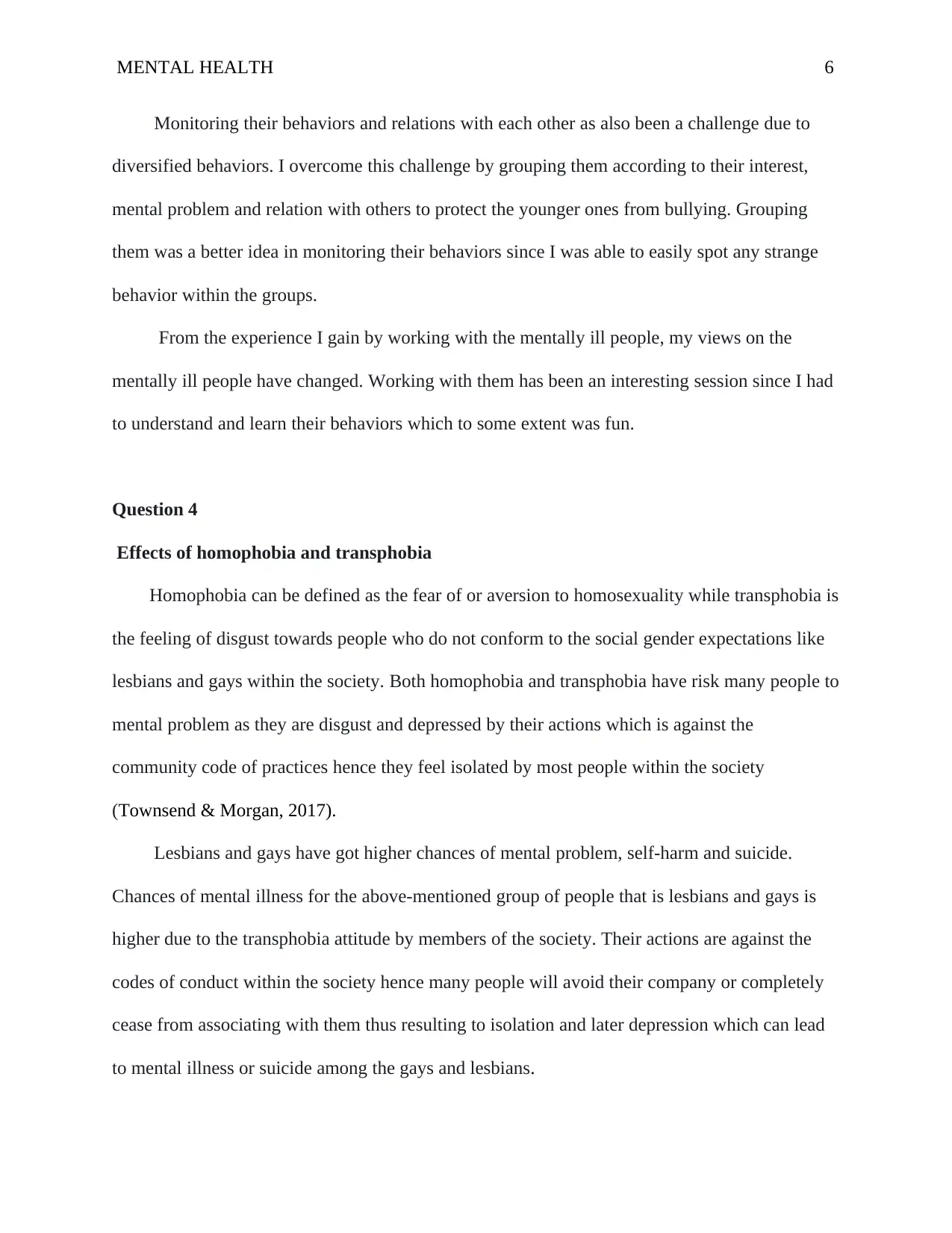
MENTAL HEALTH 6
Monitoring their behaviors and relations with each other as also been a challenge due to
diversified behaviors. I overcome this challenge by grouping them according to their interest,
mental problem and relation with others to protect the younger ones from bullying. Grouping
them was a better idea in monitoring their behaviors since I was able to easily spot any strange
behavior within the groups.
From the experience I gain by working with the mentally ill people, my views on the
mentally ill people have changed. Working with them has been an interesting session since I had
to understand and learn their behaviors which to some extent was fun.
Question 4
Effects of homophobia and transphobia
Homophobia can be defined as the fear of or aversion to homosexuality while transphobia is
the feeling of disgust towards people who do not conform to the social gender expectations like
lesbians and gays within the society. Both homophobia and transphobia have risk many people to
mental problem as they are disgust and depressed by their actions which is against the
community code of practices hence they feel isolated by most people within the society
(Townsend & Morgan, 2017).
Lesbians and gays have got higher chances of mental problem, self-harm and suicide.
Chances of mental illness for the above-mentioned group of people that is lesbians and gays is
higher due to the transphobia attitude by members of the society. Their actions are against the
codes of conduct within the society hence many people will avoid their company or completely
cease from associating with them thus resulting to isolation and later depression which can lead
to mental illness or suicide among the gays and lesbians.
Monitoring their behaviors and relations with each other as also been a challenge due to
diversified behaviors. I overcome this challenge by grouping them according to their interest,
mental problem and relation with others to protect the younger ones from bullying. Grouping
them was a better idea in monitoring their behaviors since I was able to easily spot any strange
behavior within the groups.
From the experience I gain by working with the mentally ill people, my views on the
mentally ill people have changed. Working with them has been an interesting session since I had
to understand and learn their behaviors which to some extent was fun.
Question 4
Effects of homophobia and transphobia
Homophobia can be defined as the fear of or aversion to homosexuality while transphobia is
the feeling of disgust towards people who do not conform to the social gender expectations like
lesbians and gays within the society. Both homophobia and transphobia have risk many people to
mental problem as they are disgust and depressed by their actions which is against the
community code of practices hence they feel isolated by most people within the society
(Townsend & Morgan, 2017).
Lesbians and gays have got higher chances of mental problem, self-harm and suicide.
Chances of mental illness for the above-mentioned group of people that is lesbians and gays is
higher due to the transphobia attitude by members of the society. Their actions are against the
codes of conduct within the society hence many people will avoid their company or completely
cease from associating with them thus resulting to isolation and later depression which can lead
to mental illness or suicide among the gays and lesbians.
⊘ This is a preview!⊘
Do you want full access?
Subscribe today to unlock all pages.

Trusted by 1+ million students worldwide
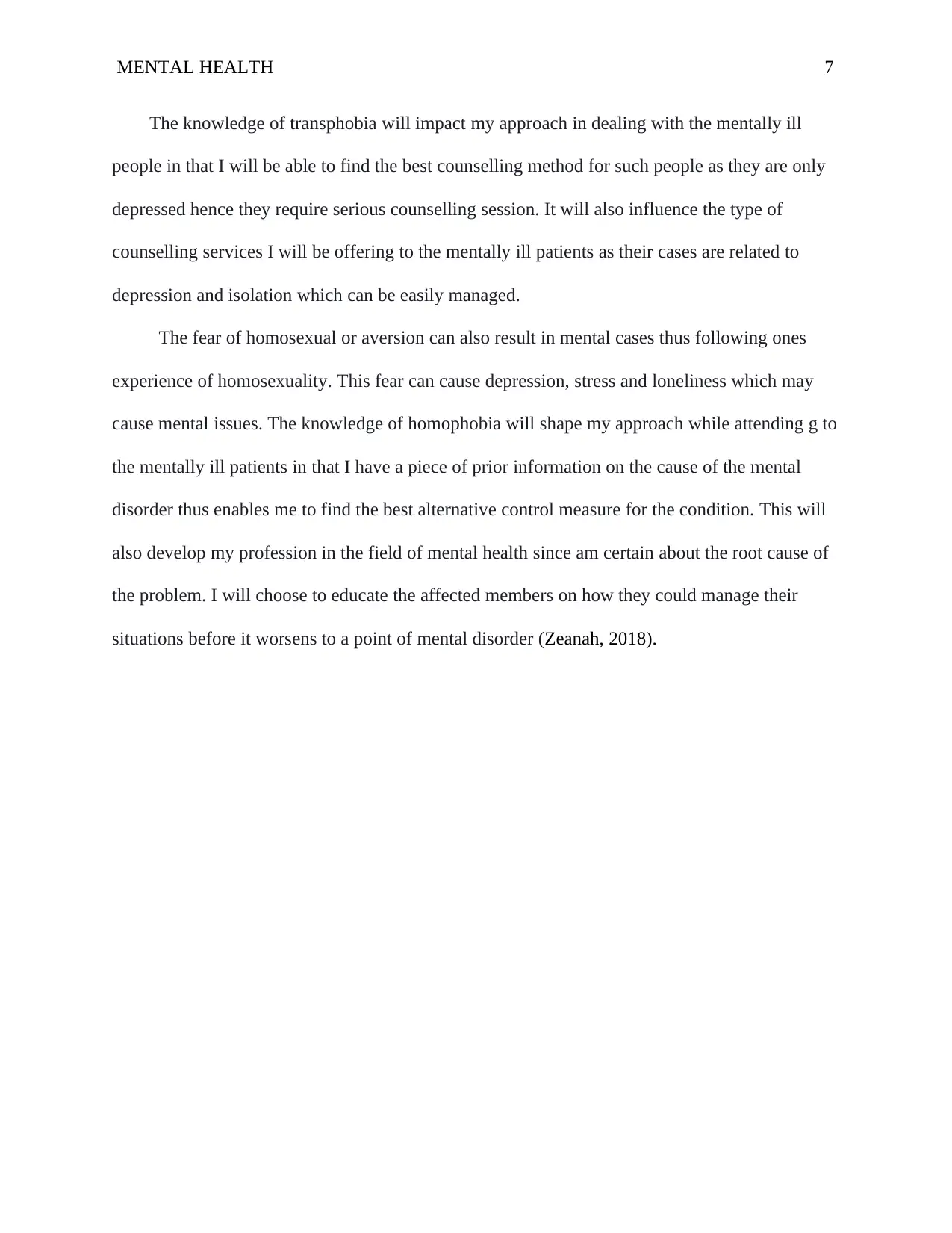
MENTAL HEALTH 7
The knowledge of transphobia will impact my approach in dealing with the mentally ill
people in that I will be able to find the best counselling method for such people as they are only
depressed hence they require serious counselling session. It will also influence the type of
counselling services I will be offering to the mentally ill patients as their cases are related to
depression and isolation which can be easily managed.
The fear of homosexual or aversion can also result in mental cases thus following ones
experience of homosexuality. This fear can cause depression, stress and loneliness which may
cause mental issues. The knowledge of homophobia will shape my approach while attending g to
the mentally ill patients in that I have a piece of prior information on the cause of the mental
disorder thus enables me to find the best alternative control measure for the condition. This will
also develop my profession in the field of mental health since am certain about the root cause of
the problem. I will choose to educate the affected members on how they could manage their
situations before it worsens to a point of mental disorder (Zeanah, 2018).
The knowledge of transphobia will impact my approach in dealing with the mentally ill
people in that I will be able to find the best counselling method for such people as they are only
depressed hence they require serious counselling session. It will also influence the type of
counselling services I will be offering to the mentally ill patients as their cases are related to
depression and isolation which can be easily managed.
The fear of homosexual or aversion can also result in mental cases thus following ones
experience of homosexuality. This fear can cause depression, stress and loneliness which may
cause mental issues. The knowledge of homophobia will shape my approach while attending g to
the mentally ill patients in that I have a piece of prior information on the cause of the mental
disorder thus enables me to find the best alternative control measure for the condition. This will
also develop my profession in the field of mental health since am certain about the root cause of
the problem. I will choose to educate the affected members on how they could manage their
situations before it worsens to a point of mental disorder (Zeanah, 2018).
Paraphrase This Document
Need a fresh take? Get an instant paraphrase of this document with our AI Paraphraser
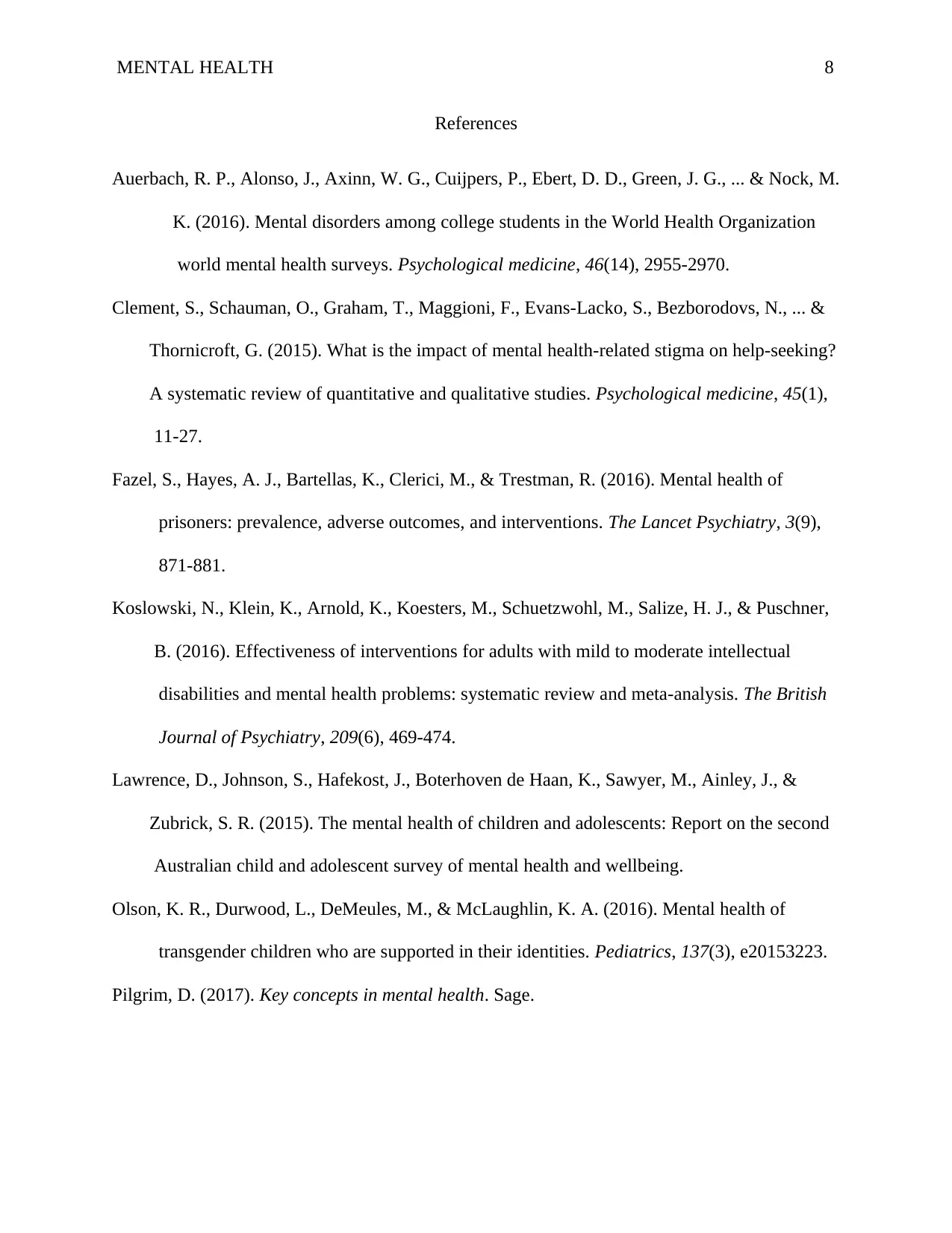
MENTAL HEALTH 8
References
Auerbach, R. P., Alonso, J., Axinn, W. G., Cuijpers, P., Ebert, D. D., Green, J. G., ... & Nock, M.
K. (2016). Mental disorders among college students in the World Health Organization
world mental health surveys. Psychological medicine, 46(14), 2955-2970.
Clement, S., Schauman, O., Graham, T., Maggioni, F., Evans-Lacko, S., Bezborodovs, N., ... &
Thornicroft, G. (2015). What is the impact of mental health-related stigma on help-seeking?
A systematic review of quantitative and qualitative studies. Psychological medicine, 45(1),
11-27.
Fazel, S., Hayes, A. J., Bartellas, K., Clerici, M., & Trestman, R. (2016). Mental health of
prisoners: prevalence, adverse outcomes, and interventions. The Lancet Psychiatry, 3(9),
871-881.
Koslowski, N., Klein, K., Arnold, K., Koesters, M., Schuetzwohl, M., Salize, H. J., & Puschner,
B. (2016). Effectiveness of interventions for adults with mild to moderate intellectual
disabilities and mental health problems: systematic review and meta-analysis. The British
Journal of Psychiatry, 209(6), 469-474.
Lawrence, D., Johnson, S., Hafekost, J., Boterhoven de Haan, K., Sawyer, M., Ainley, J., &
Zubrick, S. R. (2015). The mental health of children and adolescents: Report on the second
Australian child and adolescent survey of mental health and wellbeing.
Olson, K. R., Durwood, L., DeMeules, M., & McLaughlin, K. A. (2016). Mental health of
transgender children who are supported in their identities. Pediatrics, 137(3), e20153223.
Pilgrim, D. (2017). Key concepts in mental health. Sage.
References
Auerbach, R. P., Alonso, J., Axinn, W. G., Cuijpers, P., Ebert, D. D., Green, J. G., ... & Nock, M.
K. (2016). Mental disorders among college students in the World Health Organization
world mental health surveys. Psychological medicine, 46(14), 2955-2970.
Clement, S., Schauman, O., Graham, T., Maggioni, F., Evans-Lacko, S., Bezborodovs, N., ... &
Thornicroft, G. (2015). What is the impact of mental health-related stigma on help-seeking?
A systematic review of quantitative and qualitative studies. Psychological medicine, 45(1),
11-27.
Fazel, S., Hayes, A. J., Bartellas, K., Clerici, M., & Trestman, R. (2016). Mental health of
prisoners: prevalence, adverse outcomes, and interventions. The Lancet Psychiatry, 3(9),
871-881.
Koslowski, N., Klein, K., Arnold, K., Koesters, M., Schuetzwohl, M., Salize, H. J., & Puschner,
B. (2016). Effectiveness of interventions for adults with mild to moderate intellectual
disabilities and mental health problems: systematic review and meta-analysis. The British
Journal of Psychiatry, 209(6), 469-474.
Lawrence, D., Johnson, S., Hafekost, J., Boterhoven de Haan, K., Sawyer, M., Ainley, J., &
Zubrick, S. R. (2015). The mental health of children and adolescents: Report on the second
Australian child and adolescent survey of mental health and wellbeing.
Olson, K. R., Durwood, L., DeMeules, M., & McLaughlin, K. A. (2016). Mental health of
transgender children who are supported in their identities. Pediatrics, 137(3), e20153223.
Pilgrim, D. (2017). Key concepts in mental health. Sage.
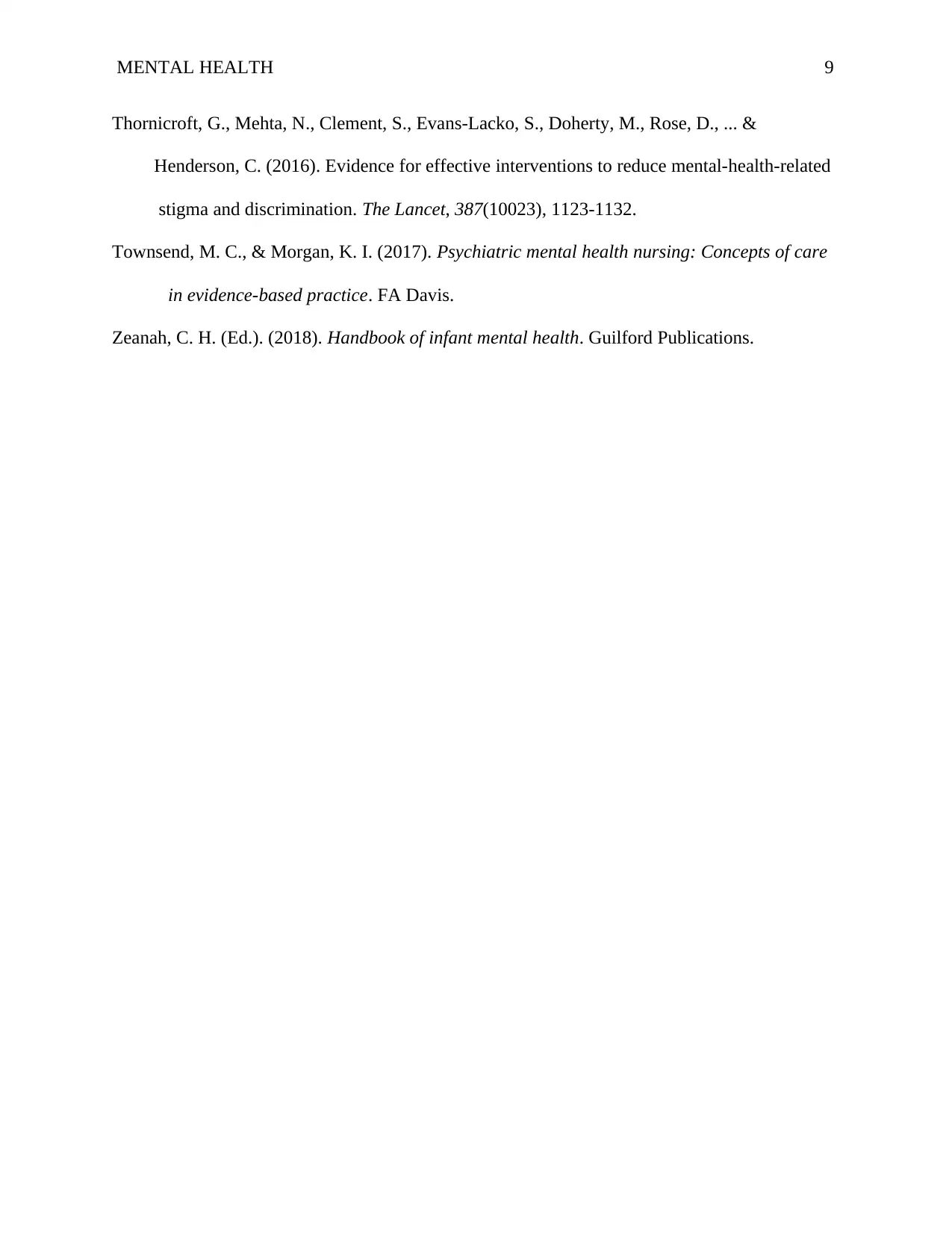
MENTAL HEALTH 9
Thornicroft, G., Mehta, N., Clement, S., Evans-Lacko, S., Doherty, M., Rose, D., ... &
Henderson, C. (2016). Evidence for effective interventions to reduce mental-health-related
stigma and discrimination. The Lancet, 387(10023), 1123-1132.
Townsend, M. C., & Morgan, K. I. (2017). Psychiatric mental health nursing: Concepts of care
in evidence-based practice. FA Davis.
Zeanah, C. H. (Ed.). (2018). Handbook of infant mental health. Guilford Publications.
Thornicroft, G., Mehta, N., Clement, S., Evans-Lacko, S., Doherty, M., Rose, D., ... &
Henderson, C. (2016). Evidence for effective interventions to reduce mental-health-related
stigma and discrimination. The Lancet, 387(10023), 1123-1132.
Townsend, M. C., & Morgan, K. I. (2017). Psychiatric mental health nursing: Concepts of care
in evidence-based practice. FA Davis.
Zeanah, C. H. (Ed.). (2018). Handbook of infant mental health. Guilford Publications.
⊘ This is a preview!⊘
Do you want full access?
Subscribe today to unlock all pages.

Trusted by 1+ million students worldwide
1 out of 9
Related Documents
Your All-in-One AI-Powered Toolkit for Academic Success.
+13062052269
info@desklib.com
Available 24*7 on WhatsApp / Email
![[object Object]](/_next/static/media/star-bottom.7253800d.svg)
Unlock your academic potential
Copyright © 2020–2026 A2Z Services. All Rights Reserved. Developed and managed by ZUCOL.





